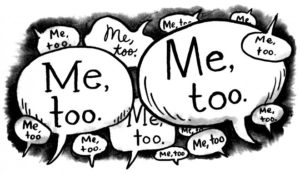
What Employers Can Do with #MeToo
#MeToo first went viral in October 2017 and has trended worldwide ever since as new high-profile allegations—some from decades ago—continue to surface. But the real power in the movement is that it’s not just for the rich and famous; many millions of non-celebrity, regular people have participated and shared their own stories to illustrate the fact that harassment happens everywhere and can and does affect anyone.
As the #MeToo movement promotes much-needed conversation about the widespread prevalence of harassment, particularly in the workplace, it presents a vital opportunity for employers to protect your employees by doing everything you can to create a harassment-free environment.
Written Policy
The first line of defense against workplace harassment is an anti-harassment policy, which is not only helpful but also required for any size organization. Your company should establish an easy-to-understand, comprehensive written policy for preventing harassment, discrimination and retaliation. An effective policy will:
- List all protected classes and characteristics (including race, national origin, sex, gender identity, gender expression and transgender status)
- Define and provide concrete examples of harassment
- State unequivocally that unlawful harassment is prohibited by all supervisors, coworkers and third parties
- Outline consequences for violating harassment policy
- Explain how employees can complain of harassment or report observed harassment
- Allow employees to report harassment to someone other than a direct supervisor
- Require supervisors to report all complaints to an appropriate representative
- Establish protocols for prompt, thorough, fair and impartial investigations (including careful and objective documentation of witness interviews, factual findings, conclusions and steps taken)
- Ensure that investigations will be kept as confidential as possible
- Confirm that employees will not be retaliated against for complaining or participating in a reporting process or investigation
- Include procedures for timely, fair remedial action if misconduct is found (note: the behavior need not rise to the level of a policy or law violation to warrant a remedy, and remedial measures might include counseling, training, a “last chance” agreement, demotion, salary reduction, bonus rescinding or termination)
- State that employees who file a complaint will be notified about the status of the complaint, the results of any investigation and actions taken
Leap Solutions can help you establish a written policy that is thorough and in full compliance with current federal, state and local requirements.

Employee Confidence
Once in place, your company’s anti-harassment policy should be shared widely and discussed openly and regularly to instill employee faith in your organization’s ability to competently handle matters of harassment and to boost employee confidence in your commitment to an inclusive, respectful, safe and responsive workplace.
According to the federal Equal Employment Opportunity Commission (EEOC), “more than 80 percent of i
ndividuals who experience harassment never file a formal complaint [and] nearly three out of four individuals who experience harassment never even raise the issue internally.” Whether they worry they won’t be believed or the company won’t take appropriate action, or they fear social or professional retaliation, employees tend to instead avoid the harasser, deny or downplay the gravity of the situation, or simply try to forget, ignore or endure the offensive behavior.
However, the #MeToo movement and the media surrounding it may well be changing this climate by bringing attention to the issue of harassment and empowering employees to speak up about it. People now more readily identify the language and behaviors that might be considered harassment and are more apt to report them. People also now recognize how damaging harassment can be to an employee’s long-term emotional, physical and economic wellbeing, and employers acknowledge how harassment can lead to decreased productivity, increased turnover, potential legal costs and harm to a company’s reputation. This time of heightened awareness is ideal for taking proactive steps such as conducting surveys to determine the extent to which harassment might be a problem in your organization, assessing your workplace for risk factors associated with harassment and exploring ideas for minimizing those risks.
Anti-Harassment Training
This is also a great time to consider new approaches to employee anti-harassment training. Historically, these trainings focused on avoiding legal liability, but today they are more productively used as tools for reducing and preventing workplace harassment. The best trainings are tailored to your specific workplace and your various employees. Strong facilitators recognize, for instance, that every generation perceives and responds to harassment differently and will customize trainings to reflect that. Baby Boomers, Generation X, Millennials and Postmillennials (Generation Z/iGen) receive and process information in unique ways, and facilitators should take advantage of traditional, non-traditional, hands-on/interactive, social media-oriented and other approaches to meet those varying needs. Two models of anti-harassment training are gaining in popularity and showing particular promise for harassment prevention:
- Bystander intervention training empowers coworkers with specific tools to safely intervene when they witness harassing behavior.
- Civility training equips employees with practical tools for achieving diversity awareness and cultural sensitivity and creating respectful and equitable work environments.

Cultural Transformation
As employees become more mindful of their own and others’ language and behaviors in light of the #MeToo movement, and as company leaders provide effective systems, tools and resources for addressing and preventing harassment, organizations begin to experience a powerful cultural shift. Instead of once-a-year lip service, anti-harassment becomes the company’s way of life. Employees at all levels and across all positions are consistently held accountable, and every individual plays an essential role in the collective solution to harassment and the creation of safe workplaces.
Leap Solutions can help you protect your employees and your company by doing everything possible to foster a harassment-free workplace.
Click here to download this newsletter